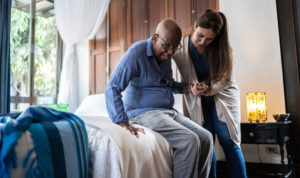
Rule would address concerns that medical information can be used for unauthorized purposes.
A federal law known as the Common Rule aims to protect individuals who are subjects in research studies—particularly those participating in medical research. The rule was codified to end unethical research practices and guarantee certain protections to human research subjects. Although it has strengthened standards in many traditional research fields, developments in new areas of research (such as genomics) and advances in information technology have presented new challenges to the Common Rule, which has remained largely unchanged since it was promulgated over twenty years ago.
When the rule was created, most of the risks associated with research studies arose from potential physical harm to participants. Now, modern harms “result primarily from the inappropriate release of information and not from the research interventions themselves,” the U.S. Department of Health and Human Services (HHS) claims.
To modernize the Common Rule, HHS and 15 other federal agencies recently issued a proposed rule that would impose additional requirements for performing research studies involving human subjects. The rule provides new standards to address data security and privacy concerns, boost the transparency of consent forms, and decrease the regulatory burdens imposed on low-risk research projects.
As research has moved from academic settings into clinical trials, electronic health records and biological samples have become primary sources of research data. Clinical research increasingly relies on information that is gathered and pooled from multiple clinical sites—data that are often shared among many research organizations. Computers have made it easier to share and parse this information, and performing more advanced studies—such as researching the human genome—has become more practical.
Pooling genomic information would streamline research practices and advance human health, according to the National Institutes of Health (NIH), a medical research agency within HHS. But HHS acknowledged the public’s concerns that sharing medical information enhances the risk that anonymous research subjects could be identified from their unique biological samples and genomic information.
Comments on the proposed rule suggest that the public wants HHS to enforce informed consent requirements on all future biospecimen use. Currently, biological samples collected for initial studies can be used in subsequent studies without the participants’ explicit consent (so long as the biological sample cannot be used to identify the subject).
Some researchers have argued that requiring informed consent for secondary studies would slow advances in science and that the use of anonymous samples does not cause real harm. HHS responded by proposing that researchers must obtain broad consent forms from human subjects in order to use biospecimens for secondary purposes—regardless of whether the specimen is anonymous.
There is one exception to the rule: informed consent would not be required when the research is not designed to discover new information about the subject. For example, a subject participating in a lupus treatment study would not need to give informed consent if the subject’s biospecimen was then used to test a product that determines whether a patient has lupus.
The Common Rule allows some studies to waive the informed consent requirement altogether, so long as they meet strict criteria. Under the proposed rule, HHS seeks to clarify the current waiver criteria and add additional eligibility requirements. For instance, new studies involving biospecimens would be eligible for waivers only if their nature would make performing the research with anonymous information impracticable. Scientific or ethical justifications— not merely cost considerations—would have to support such a finding.
The rule would deny waivers if a participant refused to give broad consent to secondary use of their biospecimen, but would allow them if the participants’ private information would be used only to determine research eligibility. Some categories of study—such as low-risk studies with independent monitoring systems, or other studies that do not qualify as research—would be exempt from the proposed rule altogether. HHS plans to develop an online filing system where institutions could request to be exempt, but maintains that waivers should be “extremely rare.”
Additionally, HHS proposed that researchers make the consent process more transparent by using consent forms that are clearer and more concise. The Secretary of HHS plans to release a broad consent form template as a guide for secondary research.
HHS hopes that the rule will “modernize the current regulations by enhancing the ability of individuals to make informed decisions about participating in research” while also reducing the regulatory burden on institutions conducting low-risk research. The rule would become effective three years after publication. The comment period is open until December 7, 2015.



